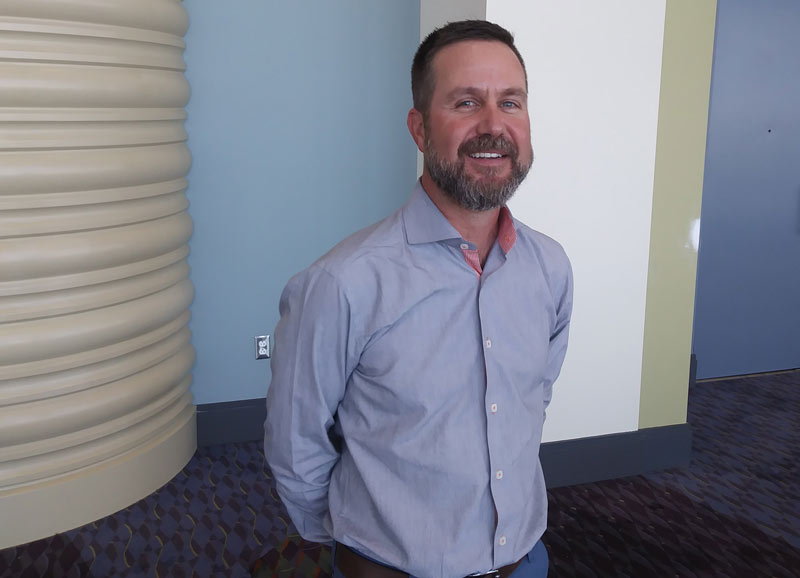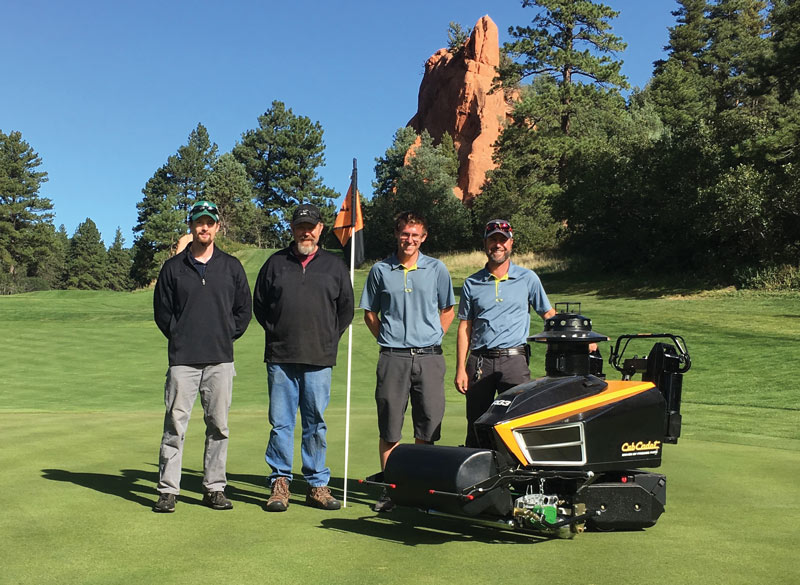
Superintendent Justin Daigle is thrilled by how autonomous mowers have performed at his golf facility. “No question, it’s been a good ride since we got them,” Daigle said. Photo by Howard Richman
Justin Daigle raved about four hardworking, smart and obedient members of his grounds crew Tuesday morning during the education session “Why Didn’t I Think of That? Ideas That Make an Impact at Your Course” at the Golf Industry Show in Orlando, Fla.
“They never argue. They always listen to me,” said Daigle, the GCSAA Class A superintendent who heads maintenance at Perry Park Country Club in Larkspur, Colo. The dutiful workers don’t get paid a cent, either, but everything about them makes sense to Daigle and to Perry Park.
So, let’s hear it for Reggie, Dot Matrix, Dozer and Twiki — some interesting names there, huh? — who, through their stellar agronomic work, have made quite a name for themselves at Perry Park. Daigle’s description? “Game changers.”
This fab four are 600-pound battery-powered autonomous mowers, and Daigle has been using the technology on his course since 2017. Reggie came along first that year, and Perry Park became just the third golf course in the U.S. to commit to robotic mowing for its putting greens. Two years ago, Daigle added the other three machines to his stable.
The club leases the Cub Cadet RG3 mowers for a fair market value of $36,000 annually, according to Daigle. Among the savings that result are less fuel and oil needed for maintenance operations, and even a $7,000 savings in labor for string trimming. Perry Park is also proud of the reduction in its carbon footprint.

Justin Daigle (far right) with some of his human crew members and Reggie in 2017. Photo courtesy of Justin Daigle
Daigle first got a glimpse of autonomous mowers five years ago at the Golf Industry Show in San Antonio, and that same year, he went to see them in action at Valley Brook Country Club in McMurray, Pa. He spent 30 hours on site and was sold.
“I noticed right away the crispness where the green meets the collar. No scalping anywhere,” Daigle said. “One of the best things I saw was failure in the middle of the green. That didn’t scare me away. They figured it out. I figured if they could figure it out, we could figure it out.”
Daigle persuaded Perry Park to take the leap, and it was a move that has paid numerous dividends. “They’re reliable. None of them call in sick, none of them sprain an ankle, and there’s no worker’s comp,” said Daigle, a 20-year GCSAA member. He noted that gusty winds can create a minor issue in the mower’s sensors that can result in some squiggly lines on greens, but the slight imperfections don’t affect ball roll. Once, a small piece of a collar got scalped, but otherwise, Perry Park has had no issues. “Our crew loves them,” Daigle said.
And what’s not to love? Perry Park’s greens remain smooth late into the day when play picks up as people head to the course after work. “Basically, you get a double cut and a roll in a single pass, and I haven’t painted a dot on a green in two and a half years,” Daigle said. “I can’t imagine us ever going back to anything else.”
Other presenters who enlightened and inspired during the “Why Didn’t I Think of That?” session were Gregg Munshaw, Ph.D., who discussed fraze mowing, and Lisa Goatley, a licensed professional counselor who shared insights on protecting one’s emotional health.
Howard Richman is GCM’s associate editor.